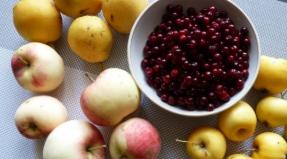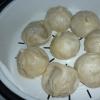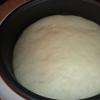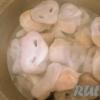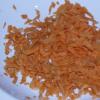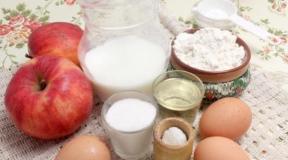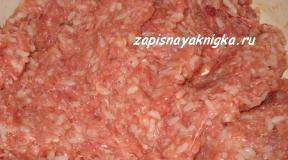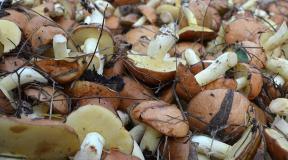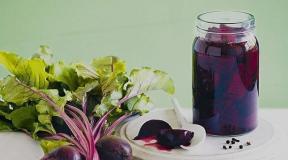How to store vegetables in the refrigerator. How to store fruits at home
Storage of vegetables and fruits
Fruits and vegetables are essential for a balanced and healthy diet. as well as cereals, meat and dairy products. They provide us with important nutrients: vitamins, minerals and fiber. Due to improper storage, fruits and vegetables quickly deteriorate. In addition, vitamins are particularly sensitive to temperature and light. So, proper storage of vegetables and fruits allows you to save vitamins for a long time. In this article, you'll discover how to store fruits and vegetables to keep them fresh and full of healthy ingredients for a long time.
Proper storage of fruits and vegetables
Different fruits and vegetables require different storage conditions. Depending on their origin, temperature and air humidity play a particularly important role in the proper storage of vegetables and fruits.
Most of the population stores fruits and vegetables in the refrigerator without thinking. On the other hand, for tropical fruits such as bananas or melons, this is not the right place at all. Due to the low temperature, the tissue cells of the fetus are damaged, and bananas become covered with brown spots. It is best to store vegetables and fruits grown in a southern climate at a temperature of 8 to 13 degrees.
If vegetables and fruits are stored in a cooler place, they lose up to 70 percent of their vitamins in just two days. In addition to heat, vitamins are very sensitive to light. Therefore, fruits and vegetables that you do not have in the refrigerator are best stored in a dark place.
Temperature is critical
The following fruits and vegetables can be stored safely in the refrigerator:
Fruits: apricots, pears, peaches, nectarines, cherries, strawberries, blueberries, raspberries, gooseberries, currants, grapes, kiwis and plums
Vegetables: Broccoli, cauliflower, carrots, kohlrabi, mushrooms, corn, leeks, lettuce, spinach, radishes, Brussels sprouts, asparagus, Chinese cabbage, and green peas.
Fruit stored in the refrigerator should be placed in open plastic bags to prevent the fruit from drying out.
A little warmer - the ideal temperature for storing vegetables and fruits from warm countries is 8-13 degrees.
Fruits: melon, mango, lemon, papaya, pineapple and grapefruit
Vegetables: tomatoes, sweet peppers, zucchini, cucumbers, onions, potatoes, garlic and eggplant
The easiest way to ensure their storage is in the basement or pantry. This is much better because it is too warm at room temperature and too cold in the refrigerator for long-term storage. And bananas are best stored at a temperature of 12 to 15 degrees.
How to store fruits
How to store vegetables and fruits
- Apples: Apples become wrinkled over time because they lose water. Therefore, it is better to store apples in a room with high humidity, such as in the basement. Apples should never be stored with other fruits because they release a lot of ethylene.
- Bananas: Bananas are not stored in the refrigerator, because there they quickly become covered with brown spots. Bananas can be stored in a cool, dry place for up to 3-4 days.
- Strawberries: Strawberries should only be stored in the refrigerator. These berries are very delicate and spoil quickly, so they are stored for no more than two days. Strawberries must also be stored so that the berries are not subjected to any pressure, otherwise you will end up with a sweet fruit with bruises.
- Melon: Melons are best stored in a basement or cool closet. If the melon has already been cut, it is best to store it wrapped in plastic wrap.
- Plums: Plums should be stored unwashed in the refrigerator. Thanks to the white coating that covers the plums, the fruits are protected from drying out.
- Grapes: Grapes, like plums, should also be washed just before eating. Otherwise, the grapes dry out faster.
- Cucumbers: Cucumbers should not be kept in the refrigerator. They stay fresh for a long time at a temperature of about 15 degrees. Therefore, cucumbers are best stored in the basement or in the pantry.
- Carrots: Carrots can be stored in the refrigerator - preferably in a perforated plastic bag. The tops should be cut off. As it continues to grow, it uses up water, and carrots can be wrinkled.
- Asparagus: Asparagus is best eaten as fresh as possible. Store in the refrigerator for no more than a day wrapped in a towel.
- Tomatoes: Tomatoes in the refrigerator where they quickly rot. They must be stored in a dry, cool place. Tomatoes should never be stored with other vegetables as they release a lot of ethylene.
- Zucchini: Zucchini, like cucumbers, are very sensitive to cold. It is best to keep them in a cool, dark place.
For proper storage of vegetables and fruits, you should know that tomatoes and apples should not be stored together with other fruits and vegetables. They have been found to release ethylene in large quantities. This gas drives the ripening processes and thus ensures that fruits and vegetables ripen and spoil faster. Other fruits, such as bananas or apricots, also release ethylene, although to a lesser extent than apples and tomatoes.
If you bought an unripe fruit, you can take advantage of this effect: place an apple or tomato in an unripe fruit and the ripening process will be accelerated.
Remember that various types of vegetables such as cucumbers, cauliflower, lettuce and cabbage are very sensitive to ethylene, and you should always store these fruits and vegetables separately.
Despite all the advice on how to store vegetables and fruits, you should always keep in mind that fruits and vegetables are best enjoyed fresh. Storage of vegetables and fruits should not be too long, because even if vegetables and fruits are stored in optimal conditions, they lose all the time in valuable nutrients. So buy as many fruits and vegetables as you need for the next two to three days.
Most vegetables are best stored in the basement at a low temperature. But what if you live in a multi-storey building and you don’t have any basement, and the temperature is below zero on the balcony in winter? Then the question arises: how to store vegetables in an apartment environment so that they stay fresh longer?
Preparatory stage
Many people use kitchen cabinets to store vegetables. But if space permits, it is better to arrange a separate rack with wooden or plastic boxes that will be well ventilated. Wicker baskets or fabric bags are also good.
It's best not to wash the vegetables you intend to store.
Vegetables must be re-sorted before being stored. It is better to throw out rotten and hopelessly damaged ones immediately, and partially dented or spoiled ones - to put aside and use them for cooking in the first place. It is better not to wash the vegetables you are going to store, as even slight damage to the skin can lead to food spoilage. On the contrary, they must be dried before laying.

Everything has its place
The main rule is that all vegetables should be stored separately, without touching each other.
Root crops - radish, beets- properly stored in ventilated boxes, preferably wooden or cardboard, from zero to room temperature. Before frost, they can be kept on the balcony, and after - find the coolest place in the apartment away from heating systems.
Potato it is ideal to store in a cool dark place at a temperature of +5...+10 degrees. In warmth, it begins to germinate, but in the light it turns green and loses its nutritional value. At temperatures close to zero, starch turns into sugar, making the potato unpalatable.

The best place to store carrots- box with dry sand. But if this is not possible, then you can pack it in paper and a plastic bag and put it in the refrigerator or on the balcony. This will keep the carrots fresh for two to three months.
Cabbage during storage, it strongly evaporates moisture, so it is advisable to store it by hanging it by a stalk or in a net. Do not cut off the upper leaves - they will dry out and protect the head of cabbage from moisture loss. You can wrap each fork in paper, the main thing - then do not forget to periodically change it to clean and dry.
If you tie the leaves into a braid and hang the bulbs on the wall, then this method will also help decorate the room.
Onion and garlic before storage, it is necessary to dry it properly in the sun or by the battery. They can be stored at room temperature, but it is also better to hang them in a net, providing good ventilation. If you tie the leaves into a braid and hang the bulbs on the wall, then this method will also help decorate the room.
To save tomatoes fresh until January, you need to select green intact fruits, wrap each of them with paper, put in a box or basket and store in a cool, dark place. After a while they will ripen and turn red.
Fresh cucumbers and sweet peppers well preserved in the refrigerator in a tightly closed pan, plastic box or jar. Eggplant and zucchini can be placed in the refrigerator in the vegetable compartment.

To parsley or dill preserved as long as possible, they need to be thoroughly dried and hidden in the refrigerator in a bag of thin polyethylene or a plastic box. green onion It is also better to keep in the refrigerator, but it is important to first separate it from the bulbs - he does not like it when the roots come into contact with feathers.
Greens can also be stored frozen. To do this, it must be finely chopped and placed in the freezer in a plastic bag. It is better to divide the greens into small portions so as not to defrost the entire volume every time you need to take a little for cooking.
Vegetables such as carrots, beets or sweet peppers can also be frozen for the winter, but before that they must be thoroughly washed and dried. They can be stored whole, or they can be cut - to prepare a kind of semi-finished products.
Just think about it: according to the UN, about a third of all food produced in the world is wasted. The food we throw in the trash is one of the biggest causes of climate change. At the same time, we are not only harming the planet, but also throwing away our money. Proper storage of fresh products will help to avoid wasting the family budget.
How to make the purchased vegetables and fruits stay fresh longer, say experts of the discounters "DA!".
Separate vegetables and fruits
You need to store them separately from each other. That is why in refrigerators, as a rule, there are two pallet boxes, where the temperature is kept at 8-10 degrees. Too low a temperature destroys the structure of fruits and vegetables - then they spoil or lose their taste and aroma. It is most correct to store vegetables and fruits in paper bags or perforated packages and containers so that air can enter them.

Keep vegetables unwashed
Before placing fruits and vegetables in the refrigerator, it is better not to wash them. Moisture will cause fresh food to spoil quickly.
Put the greens in the water
Parsley, dill and other herbs wither quickly in the refrigerator. Employees of the YES! advise: to prevent this from happening, cut the roots and dip the greens in a glass of water, then it can be placed in the refrigerator. Some of our customers store their greens wrapped in damp cloths - this is also a great way.
Separate bananas and tomatoes
The fact is that some fruits and vegetables emit ethylene, which accelerates the ripening of other fresh foods. These include, for example, apples, bananas, tomatoes, avocados. It is better to store them separately, then they will not lead to overripening of their "neighbors" in the refrigerator.
Cut off tops of root vegetables
Beets, carrots, turnips, radishes, radishes - all of them can be stored in the refrigerator for a long time if you cut the tops after purchase. At the same time, you should not peel the root crops - it is better to do this immediately before cooking. Thus, carrots, for example, can lie in the refrigerator for about two weeks.
Store onions and garlic separately
These foods keep well in the refrigerator (and garlic is also easier to peel chilled), but they spread their flavor and can affect the flavor of other foods. Place onions and garlic in breathable containers or paper bags, then refrigerate.
Choose quality products
It is quite natural that rotten and stale products will have to be thrown away after a few days, or even hours. The key to long-term storage is the quality of products. In the network of discounters "DA!" we place the strictest requirements on the freshness of fruits and vegetables. In addition, all products undergo the strictest control for the composition and presence of pesticides!
- We accept goods grown in ecologically clean soil without the use of dangerous nitrates and chemical fertilizers. We also work directly with local producers and farmers, so our products get on the table to buyers in the shortest possible time.. Strict temperature conditions are observed in all warehouses, each of our suppliers of vegetables and fruits knows that his goods will not only undergo strict checks, but will also be accepted into the appropriate receiving areas with certain conditions.
Harvesting vegetables for the winter is a common activity for residents of cold regions. Knowing how to properly store vegetables and fruits helps you save on buying expensive vegetables in winter and spring, using your stocks.
Storing vegetables and fruits at home - basic rules
As for the issue of preserving plant products, it must be said that each fruit and vegetable needs its own approach. There is no single answer to the question of how to store vegetables and fruits. But there are some patterns, knowing which you can orient yourself regarding the conditions suitable for a particular product.
For example, heat-loving vegetables from tropical latitudes (tomato, cucumber, potato, tomato, melon) need a positive temperature. Cold-resistant (white, Beijing, Savoy, cauliflower, Brussels sprouts, broccoli, celery, turnips, carrots, beets) can be stored at zero or slightly below zero temperature. Cabbage can withstand temperatures as low as -2°C without damage. Increasing the temperature to + 2 ° C or more can be fatal for her.
Most vegetables are easily damaged by mold in high humidity, so storage needs to be monitored along with temperature fluctuations. To reduce the level of humidity in cellars and sheds, a bucket of lime is installed. This helps keep the humidity within normal limits.
Fruit storage at home is most often done in the refrigerator. Most fruits can be stored in a special compartment of the refrigerator for 3 to 7 days. It is not recommended to store bananas in the cold, but they can be frozen for subsequent preparation of confectionery dishes from their pulp. Do not store fruits in the sun, this will lead to wrinkling due to loss of moisture. An exception is the ripening of tomatoes.
Optimal conditions for home storage of fruits
Storing vegetables and fruits in the kitchen is one of the ways that residents of apartment buildings practice. In urban conditions, this room is almost the only place where it is convenient to store vegetables. Some of them are placed in the refrigerator, some are hung on the walls or placed in boxes. If the apartment has a pencil case, closet or pantry, many fruits and vegetables can be kept there.
Owners of private houses were more fortunate. Stocks on private property may be stored underground, in a basement, in a shed, or in a garage. The best storage conditions for most fruits and vegetables are +5…+10°C and 40-50% relative humidity. Sunlight must not fall on the products. Most of them keep well in a dark, dry, cool, ventilated place. Stocks should be inspected from time to time to remove spoiled fruit.
How to store fruits?
Speaking about how to properly store fruits, it should be said that berries and fruits growing on trees are not recommended to be placed next to vegetables. In the refrigerator, it is better to distribute them in different compartments. Pack fruits in paper bags (paper absorbs excess moisture and promotes longer storage). Overripe and rotten fruits are not subject to storage.
Unripe fruits can be left to ripen in the kitchen at room temperature. Not all types of fruits and their varietal subspecies have the ability to ripen, being plucked from the branch ahead of time. But if we are talking about apricots, pears, plums and peaches, then in most cases they are able to ripen at room temperature, being laid on the kitchen table or windowsill.
Do not put gourds (melon, pumpkin, watermelon) in the refrigerator. They are placed in the refrigerator compartment only after they have been cut. Apples should not be placed next to other fruits, since the ethylene contained in apples and released into the atmosphere by them can cause overripening and spoilage of other fruits. Apples are placed in a paper bag and kept on the top shelf of the refrigerator. Bananas are left until fully ripe in the room. A refrigerator is contraindicated for them, as well as laying on a central heating battery to speed up maturation.
The most correct answer to the question of how to store fruits is to say that each fruit requires its own approach. But there is a general condition: the fruits must be stored in such a way that air enters them. Along with the traditional method, there is a technology for storing products in vacuum bags, but such packaging requires special equipment, and therefore is rarely used at home.
Lemons and other citrus fruits are often refrigerated, but they retain their fullest flavor when stored indoors. The optimum temperature for them is within + 10 ... + 25 ° C.
How to store vegetables?
Vegetables in the apartment are recommended to be stored in the pantry, refrigerator or special boxes in the kitchen. In cold conditions (at a temperature of + 5 ° C), asparagus, all types of cabbage, carrots, radishes, celery, beets, radishes, green crops, eggplants, bell peppers should be stored. Cucumbers, zucchini, garlic and onions can be stored both in the refrigerator and in containers in the kitchen. Potatoes are best placed in cardboard boxes or wooden boxes and stored at room temperature. It is important that the tubers do not get sunlight.
Tomatoes are also best stored in a room, but, unlike potatoes, sunlight is not contraindicated for them. Greens (cilantro, parsley, basil, dill) can be put in glasses of water and left at room conditions. Mushrooms are placed in the lower compartment of the refrigerator, they can be placed next to vegetables. All fruits intended for long-term storage are not recommended to be washed. This breaks the protective layer on their skin and shortens the shelf life of the products.
For five days, we will talk about how to equip your home, make budget repairs, deal with utility bills once and for all, and find beautiful interior items. This article is about how to properly store food at home.
Vegetables and fruits
All fruits and vegetables release ethylene, a colorless gas that causes ripening. The more mature the plant, the more gas. The largest amount of ethylene is released by overripe fruits, such as a rotting tomato. If it or a banana skin is put in a box with unripe peaches and closed, the peaches will begin to ripen faster than in the open on their own. On an industrial scale, vegetables and fruits are placed in chambers with ethylene to speed up ripening.
Ideally, vegetables and fruits should be stored in paper bags separately from each other: paper creates isolation, including from diseases.
Plastic bags are also suitable, the main thing is to ensure that the products in them are dry. If you plan to eat vegetables and fruits within a few days, it is not necessary to keep them in the refrigerator.
Tomatoes
Whether to store tomatoes in the refrigerator or not is a moot point. On the one hand, when cold in a tomato, as in any other product, metabolic processes slow down. On the other hand, a tomato is a specific product that quickly deteriorates in the light, and fades in the cold due to its watery structure. Tomatoes were often dehydrated in old-style refrigerators, while new ones are made according to the so-called “weeping type”, when moisture collects on the back wall and then flows into a special tray. In this way, the refrigerator maintains a relative humidity close to 100% versus 75% in the past. Accordingly, you can store tomatoes in such a refrigerator. The main thing is not to forget about expiration dates.
Potato
In the light, potatoes, like other plants of the nightshade family (for example, eggplant, tomato and pepper), begin to turn green and at the same time produce the poisonous substance solanine. It is better not to eat such potatoes or cut off the affected area on it. You need to store potatoes in a dark and cool place, at a temperature not higher than plus 2-4 degrees Celsius, otherwise it will begin to germinate. Of course, ideally, potatoes should be stored in the cellar, as they did before, but a refrigerator is also suitable. And it is better if the tubers are in a paper bag.
Onion and garlic
In order for onions and garlic to be preserved for a long time, they must be in a cool, ventilated place, otherwise they will dry out and rot, as a fungus can infect them in heat.
Sauces
Sauces can be stored in the refrigerator or on the counter. The only problem (if, of course, this is a problem at all) is that they can thicken. But this does not mean at all that their taste or texture will collapse.
Honey
One of the few foods that is really better not to be stored in the refrigerator. This is not a living organism, like, for example, fruits and vegetables, it does not have biochemical processes that can or should be slowed down with the help of cold. In the refrigerator, due to the low temperature, honey will crystallize and thicken.
Greenery
Greens must be washed initially, including in order to separate the good from the spoiled. Next, the most important thing is to dry thoroughly. The best way to do this is with a paper towel.
There are several ways to store greens, for example, in a glass jar with a plastic lid, or in a plastic bag with holes made in it for air to enter. In fact, it is most convenient to wrap the greens in a damp cloth towel and put in the refrigerator.
Tea, coffee, spices, yeast
Here the main task is to limit evaporation as much as possible, as well as buy these products in moderation, since they also cannot be stored forever. You can pour tea and spices into glass or tin jars, but make sure that they are tightly closed.
As for the instant yeast popular recently, they need to be stored in the freezer, and warmed before use. Fresh yeast should be stored in the refrigerator according to the expiration date.
Raw meat and fish
Chilled meat can be stored in the refrigerator for no more than two to three days. If you do not initially plan to cook from meat in the near future, it should be frozen. It is better to freeze the meat not in a large piece, but in portions, so that what is not useful during cooking does not have to be re-frozen. When meat is frozen and thawed, ice crystals change its structure; defrosting leads to loss of liquid, respectively, to the loss of juiciness of the finished dish. The same with other products: fish, berries, vegetables and so on.
The meat is subjected to shock freezing: its temperature drops from plus 2-4 degrees to about minus 30 in a matter of minutes. Thus, the cell walls do not have time to be destroyed by ice crystals. Subsequently, when defrosting, the loss of juiciness is minimal.
For storage, containers made of plastic or stainless steel are suitable.
Milk products
Dairy products are not stored for a long time: for example, milk, something from under a cow, can last in the refrigerator for two days, pasteurized - six. In addition, products can quickly turn sour from the touch of foreign non-sterile objects. It is better to store industrial products in the original container according to the specified period.
canned food
Unopened canned food - fish, corn, peas, whatever - can last a long time in the refrigerator. It is impossible to continue to store open canned food in the same way; they must be transferred to a tightly closed container.
Eggs
Eggs are stored for a long time and can safely do without a refrigerator for up to a month if the shell is not damaged. So in the refrigerator they can be stored without problems, and on any shelf. Even on the one in the door, contrary to the common misconception about the dangers of the unstable temperature of this zone, due to which the eggs can deteriorate. By the way, in modern refrigerators, all shelves have approximately the same temperature. Eggs will spoil only if they lie warm for several weeks.
Flour, cereals and other bulk products
You can store them both in the purchased packaging and in hermetically sealed containers: glass, tin, plastic. The fact is that insects can start in bulk products, for example, in flour - beetles. It is difficult to deal with them, but you can: sift the flour, monitor its expiration date and store it in containers with threads through which insects will definitely not crawl.
Such advice as “put garlic or capsicum in flour, and there will be no bugs” should be avoided: these are, of course, grandmother's technologies, besides, garlic will smell like flour.
Cheese
Cheese can stay fresh for a long time if stored properly. It cannot be wrapped in plastic wrap, otherwise the cheese will not be able to breathe. Parchment paper is best - it allows enough air to pass through and does not allow the cheese to dry out. If the variety has a strong smell, it should be kept away from other cheeses and other products. So that the whole refrigerator does not smell, the cheese wrapped in parchment should be put in a tightly closed container.
Soft cheeses, such as mozzarella, should be stored in their own liquid; in addition, you need to remember that soft cheeses are stored less than hard ones.
Bread
The more fermentation the bread has undergone, the longer it will be stored. Fresh bread should be kept at room temperature in a paper or plastic bag (in the second case, the crust will lose its crunch). Storing bread in the refrigerator is not a disaster, but still you should not leave it there: in the cold, the crystallization of the starch that is part of the bread accelerates, and it stales faster.
In the freezer, on the contrary, bread is stored perfectly and for a long time, and industrial technologies for long-term storage of bread are based on this.
Creamy, sunflower, olive
and other oils
Butter is stored according to the expiration date. It is not necessary to change the packaging, it is only important to tightly wrap the oil in it, otherwise it will go rancid.
As for sunflower and olive oils, it is not recommended to store them in the refrigerator: the oil freezes and thickens. Such oil should be kept in a dark place and preferably in dark glass bottles, avoiding exposure to sunlight.
True, there are also oils that need to be stored in the refrigerator: linseed, sesame and any other fresh-pressed, otherwise they quickly deteriorate.
Mushrooms
If we talk about forest mushrooms, then this is really a perishable product and can be kept fresh in the refrigerator for no more than two days. At the same time, the mushrooms must be dry, therefore, before being placed in the refrigerator, they can only be cleaned of dirt, and washed immediately before use. If possible, mushrooms should be used immediately. Or, for example, dry or freeze.
Quick freezing is very important: The faster you freeze food, the better quality it will be.
